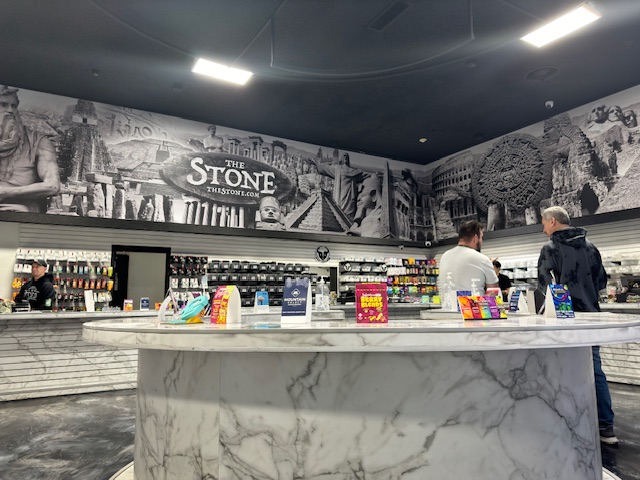
This website is for users aged 21 and over. Please confirm your age.
The Cannabis Scene in Denver
Because the cannabis industry is expanding, the number of dispensaries follows suit. So, let’s take a look at what’s out there. It is crucial to understand the laws and regulations surrounding dispensaries in Denver. The information will serve best customers and prospective dispensary owners.
A Dispensaries Table
For more info about Denver dispensaries, we’ve made a table. It has dispensary names, addresses, phone numbers, and price ranges.
Unique Features
Besides products and services, there are other unique features to consider when choosing a dispensary. Things like accessibility, budtender knowledge, cleanliness, and security are essentials.
A Fact
According to the Colorado Department of Revenue’s Marijuana Enforcement Division (MED), as of May 2021, there are over 500 licensed medical and recreational marijuana establishments in Denver.
To understand the legal framework for dispensaries in Denver with city licensing and registration requirements, state licensing and regulation, and federal law and marijuana. These sub-sections explore the legalities of opening and operating a dispensary in Denver, from obtaining necessary licenses and registrations to adhering to state and federal regulations for marijuana.
You will need certain licensing and registration requirements to run a dispensary in Denver. First, prospective business owners will need a business license before operations begin. They will also need a store layout diagram, liability insurance proof, and ownership documentation must be provided for this. A dispensary license is valid for two years; renewing it before expiration is necessary.
Operating hours are restricted from 8 am to 10 pm. THC and CBD potency in cannabis products must follow the Marijuana Enforcement Division (MED) regulations. Dispensaries must also keep proper records and report any adverse effects or reactions customers suffer to the MED.
Unique details include that special permits are required to offer additional services like on-site consumption areas or delivery services. In addition, such credentials require separate approvals from state and local authorities.
Concerning the above requirements knowing the laws and regulations governing dispensaries in Denver will be helpful.
Denver initially had difficulty regulating dispensaries as many illegal stores operated as medicinal marijuana outlets. However, with increased scrutiny and improved regulations by city officials, legal dispensaries have been successful while helping improve public health through better quality control measures.
The State Licensing and Control Authority oversees the regulatory framework for cannabis dispensaries in Denver. They develop and enforce policies related to cannabis cultivation, sale, and consumption. Businesses that meet strict criteria regarding safety, security, and compliance with local laws receive licenses.
Dispensaries must keep accurate records of their operations, such as inventory, customer information, and sales data. In addition, state officials do inspections to make sure that all owners adhere to laws and regulations.
To ensure transparency and accountability, regulators have introduced a standardized testing system for cannabis products. In addition, product labeling must have information about potency and associated health risks.
Dispensaries can also promote responsible use by providing educational materials. And this could include information on the impact of consuming too much cannabis or combining it with alcohol or other intoxicants.
In conclusion, effective regulation is essential for safe access to cannabis products for medicinal purposes while minimizing public health and safety risks. Hence, understanding laws and regulations concerning dispensaries in Denver.
The legal status of cannabis is complex. For example, some states have legalized it for medicinal and recreational purposes. Yet, at the same time, it remains illegal under federal law. This creates some challenges in forming a stable regulatory framework for the industry.
Before Colorado legalized recreational marijuana, many states had already authorized the use of medical marijuana. Since then, federal law enforcement officers must try to stay current with state and federal regulations.
Policymakers need to update legislation to create a practical legal framework for dispensaries in Denver. And at the same time, this will require collaboration between governments at both state and national levels. It does help for everyone to be on the same page concerning laws and regulations for dispensaries in Denver.
One example of this legal challenge happened after The Senate passed Amendment 64 in Colorado. As a result, medical Marijuana Inc. (MMJ) faced issues with their CBD products when shipping out of state due to the potential lawsuits they would face because cannabis was still illegal under U.S. jurisdiction.
Establishing effective business practices in Denver ensures a successful and lawful cannabis dispensary. To optimize your dispensary operations, financial management and taxation, security, and transportation of cannabis, as well as advertising and marketing guidelines, are vital components that must be in place.
Finances and taxes of a dispensary? Must manage them with care! Track expenses, income, and profit margins accurately. Also, cannabis taxes and laws you must know – to not suffer legal and financial woes!
Cash flow is essential, too – most banks are hesitant to lend. So establishing a solid financial plan to ensure financial stability is highly recommended. It helps to know and keep consistent income trends. Budgeting and forecasting – it’s the way to go – to remain stable with changes that the industry will show!
Records for transactions – keep detailed ones, for sure. Consequently, this helps with audits and taxes – proper documentation is necessary!
Accountants and consultants can help with bookkeeping, tax planning, and such. Knowing the ever-changing regulations is essential – each municipality has its own, so do watch!
Neglecting these factors could have severe consequences for running a successful dispensary. Therefore, financial management and taxes are essential elements!
When moving marijuana and its products, specific security measures must be in place. Such as security at the dispensary, documentation, and vigilant transportation.
A table with details of these steps is below:
| Security Measures | Details |
|---|---|
| Access control measures | Video surveillance, alarm system, GPS tracking |
| Transportation Documents | Bill of lading, route map |
| Unique Packaging | Proper labeling using tamper-evident packaging |
| Insurance | Full coverage insurance for any incidental loss/damage |
It is vital to adhere to these measures and keep security and transparency in mind when shipping marijuana.
Transporting marijuana across state lines is illegal, according to federal law. Therefore, dispensaries must audit and check quality to comply with state laws.
To protect cannabis products further, use a specific armored vehicle or contracted shipping services. In addition, the transportation service provider should have a licensing/permitting process in place.
Following these practices can make the dispensary experience safe and successful.
Adhering to regulations is a must for Denver dispensaries. The guidelines cover language, promotion mediums, and even sign size. Terms that could mislead or appeal to children must be a consideration. Using plain language should be used to communicate product benefits. Promotions must only take place on private property, not in public spaces.
Social media platforms have their restrictions. Care is crucial when it comes to marketing on these networks. SEO can help visibility online without paying advertising, which could land the dispensary in trouble with regulators.
Dispensary owners should prioritize transparency and compliance; therefore, effective marketing strategies must be within legal limits.
To ensure employee and customer safety in Denver dispensaries, employee training, background checks, monitoring and controlling access to products and services, and lab testing and product labeling requirements are essential. This section will explore how ensuring a secure and protected setting for employees and customers is vital.
Employees’ skills in customer service and safety are crucial to success. Therefore, dispensary owners must have training programs conducted with background checks, drug tests, and safety protocol training. And this is to prevent hazardous conditions that can harm customers and employees.
Safety should be a top priority for any business. It allows business continuity and builds customer trust. Background screening reveals potentially risky staff that may hinder the business. Taking out insurance gives protection from unexpected circumstances.
When employees pass comprehensive background checks, it creates a good reputation and reduces liability risks. Drug screening finds those who may damage the company’s products or services. During training, clear explanations of protocols keep everyone safe during an emergency.
Forbes states over 40% of small businesses suffer financial losses due to employee theft or fraud. Thorough vetting helps identify bad actors before they become a risk to company security.
Ensuring the safety of employees and customers is critical. And businesses can achieve this with ID checks, security cameras, controlled entry points, and staff training.
See below for a table that explains each method:
| Method | Description |
|---|---|
| ID checks | Employees or customers must show valid ID to gain access. |
| Security cameras | Cameras in strategic spots survey activity and detect suspicious behavior. |
| Controlled entry | Barriers or turnstiles that need a card or PIN code to enter. |
| Staff training | Employees learn to spot risks and handle emergencies. |
However, more than merely implementing these measures is required. It’s also essential to monitor their effectiveness regularly.
The National Safety Council found that 4.1 million workplace injuries happen yearly in the U.S. This shows the need for adequate safety measures.
Testing and labeling are critical for employee and customer safety. In addition, labeling and testing tell users of potential risks and how to use the product. Follow this to avoid harmful health effects.
The table shows the required testing and labels:
| Testing | Requirements |
|---|---|
| Chemical Analysis | Spot toxic substances. Determine levels to be safe. |
| Safety & Efficacy | Check the product won’t harm people if used as directed. Confirm the product does what it’s supposed to. |
| Labeling | Tell users of risks, warnings, how to use, how to store, how to discard, and contact details for maker or distributor. |
It’s important to note that testing of new products must be mandatory before sales.
These rules are there due to past incidents where people were hurt. An example is Johnson & Johnson’s talcum powder, recalled due to asbestos contamination, which caused breathing problems for people who accidentally ingested it.
By following lab testing and product labeling, we can ensure no one is hurt and everyone is safe.
To understand the future of dispensaries in Denver with changes in laws and regulations, growth and expansion opportunities, and impact on local communities and economy as the solution. Explore the benefits of these changes for the dispensaries to expand and thrive while considering their effects on the local community and the overall economy.
Legalized marijuana creates an ever-shifting regulatory environment for dispensaries. Local regulations can be challenging to comply with, and federal intervention is always possible. To survive, dispensaries are adapting by offering more than just product sales. They provide recommendations, health and wellness treatments, and other services for repeat business.
Unfortunately, some district jurisdictions have excluded specific stakeholders from the medical marijuana industry. And this has aggrieved dispensary owners who must pivot from simple storefronts to a wide range of standard retail operations. They now provide services beyond the sale of cannabis flowers, such as bespoke customer recommendations.
In Denver, the cannabis industry is ready for growth, and lots of chances exist. Businesses can take advantage of these by expanding their products, locations, and customers with creative tactics. Adapting to new markets and tech is vital for progress, and being proactive is essential for long-term success.
Convenience is critical, so dispensaries should consider alternate selling methods, such as e-commerce or delivery. This could be great for customers and businesses, as now they can access products remotely.
As legalization and acceptance of cannabis increase, more competitors will join this market. To stay ahead, dispensaries should consider broadening their product range to include smoking accessories and other services.
Denver dispensaries have a massive effect on the local economy. Jobs and taxes increase. Plus, a safe place for cannabis users is necessary. Also, education and responsible use is encouraged, reducing the stigma around marijuana. Even though conservative groups oppose it, dispensaries have become popular in Denver. The industry is sure to keep on growing.
A unique part of this impact is on small businesses. Products come from the local area, helping other industries like agriculture and transportation. Dispensaries also partner with restaurants or retailers for promotions, stimulating the economy.
In one example, a Colorado town saw more revenue after legalizing recreational marijuana sales. Residents were initially worried about safety and morality. But, once they saw how the dispensaries helped the struggling economy, they changed their minds. Today, thanks to its cannabis industry, the town still thrives.
Denver dispensaries can positively affect the economy and community. With education, responsible use, and collaboration with other businesses, they can do even more to drive economic growth in the region.
We warmly welcome you to explore our highly acclaimed strains, concentrates, and edibles. Serving recreational clients with pride is our passion.
At our dispensary, you'll find a professional yet inviting atmosphere that prioritizes your comfort and privacy. Feel free to stop by at your earliest convenience to experience it for yourself. We can't wait to serve you!


